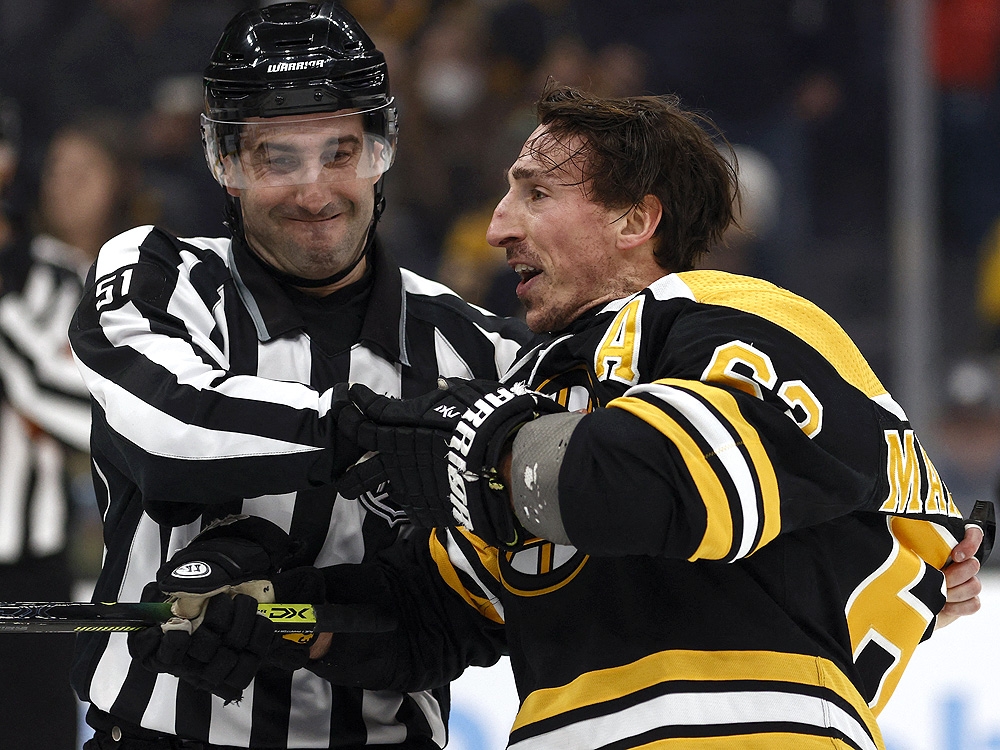The Boston Bruins captain Brad Marchand is an effective player. Why does Hockey Night in Canada’s Kevin Bieksa believe he crossed the line?

When Game 4 was over at the end of the evening, the Toronto Maple Leafs had lost another tough game. The game was almost total frustration, and fans and players got caught in the crossfire.
Despite a late-game effort that saw the Maple Leafs step up their performance in the third period, it was too late. The team ultimately fell 3-1 to the Boston Bruins, putting them at a daunting 3-1 disadvantage in the series. While the Maple Leafs’ playoff hopes are hanging by a thread, another narrative caught the attention of hockey enthusiasts during the game—Brad Marchand‘s contentious style of play.
Several Plays Raised the Hackles of Former Player Kevin Bieksa
During the second period, the Bruins captain was again noted for his behavior on the ice that crossed the line for many. That includes even the hockey analysts, who are paid to stay level-headed throughout the broadcasts. In this case, current Hockey Night in Canada analyst and former NHL defenseman Kevin Bieksa and the panel discussed a controversial moment from Game 4. The incident was a late first-period hit by Brad Marchand on Tyler Bertuzzi, which Bieksa and other panelists condemned as “dirty.”

Although he’s known for his aggressive tactics, Marchand crossed the line with analyst Biekas. Kieksa noted Marchand’s dirty play during the second period, which was the dangerous undercutting of opponents. During this maneuver, Marchand dangerously cuts in front of players, causing them to trip or fall by targeting their legs. It has the same effect as slew-footing, except it’s from the front of the player and not from behind the player. Yet, the tactic is just as dangerous.
Bieksa Noted the Risks Involved in Such Plays

This specific style of play drew sharp criticism from hockey analyst Bieksa. Speaking on a Hockey Night in Canada panel between the second and third periods, Bieksa highlighted the risks associated with such actions. Bieksa was no angel himself on the ice. Yet, despite his own history of tough play, he disapproved of Marchand’s dangerous play
Not only did Bieksa point to a broader concern about fair play and sportsmanship in the league, but he also spoke about how dangerous the play was. It’s a play that leaves them vulnerable because the opposition player did not expect it. There’s simply no protection from what Marchand has learned to do so well.
The Hockey Night in Canada panel discussed the details of the incident. The hit occurred just as the horn sounded to end the first period, with Marchand targeting Bertuzzi in what Bieksa described as a “low bridge” maneuver. This type of play involves a player lowering their body to an unusually low position to make contact, potentially causing the opponent to flip over dangerously.
Bieksa highlighted that this isn’t Marchand’s first instance of such behavior. He noted the Bruins’ captain has a reputation for similar incidents throughout his career. He specifically recalled a previous episode involving Sammy Salo during the intense Vancouver-Boston rivalry years ago, illustrating a pattern of behavior that Marchand has seemingly continued.
Marchand’s Plays Are Both Deceptive and Dangerous

The panel pointed out that Marchand strategically chooses moments when players can’t protect themselves. That makes the hits dangerous and arguably intentional. Bieksa mentioned how Marchand has been known to do this “a little bit.” He also emphasized the deceptive nature of these plays, which often look like trips or clips.
Bieksa was adamant that the league should not tolerate such actions. He suggested that Marchand should face immediate repercussions for his conduct. He argued for both in-game penalties for such infractions and post-game fines to deter similar behavior in the future.
The panel agreed that Marchand’s conduct in Game 4 was unacceptable and deserving of disciplinary action. They stressed the importance of the NHL addressing these issues promptly. There are two issues: maintaining player safety and upholding the integrity of the game. With Marchand’s history of similar incidents, the call for stricter enforcement seemed both urgent and necessary to prevent further dangerous situations on the ice.
By the way, interestingly enough, Marchand has not been assessed a penalty in this series. What does that say?





